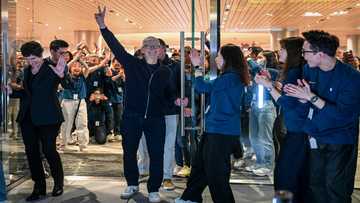Apple's 'Walled Garden' under fire in lawsuit

Source: AFP
Call it a "walled garden" or an ecosystem, but at the heart of Thursday's blockbuster US lawsuit against Apple are the many ways the company gets customers to remain faithful to its products.
Apple versus PCs
Very early on in its nearly half-century history, Apple made a decision that its products were to stand out alone and shouldn't be combined with products from other companies.
With fans touting its better design and easier interface, Apple computers often drew the vitriol of PC users who equated its products as a technological straitjacket, denying users flexibility to add software and features as they saw fit.
This ethos never left Apple and very much informs the accusations brought against Apple: the company built by Steve Jobs is like the Hotel California, you can check out but you can never leave.
OS or nothing
At Apple, hardware is always the center of its universe and before the advent of the iPhone, the pole star was the Mac computer that wouldn't run on Microsoft's world-dominating Windows operating system, or use a mouse that wasn't made for Apple.
Apple's software is specifically designed for its devices and intended to offer seamless integration. You simply are not allowed to run any other operating system than Apple's OS on Apple devices. The two are as one.
The world of Apple often draws comparisons to luxury goods rather than tech. To stay in this universe, you must pay a premium and discounts are rare.
Garden grows

Source: AFP
With the iPhone revolution that made Apple one of the most profitable companies in history, the ecosystem only grew.
In 2012, headphones required the Apple-only lightning cable and no longer the audio jack that had done fine since the advent of the Sony Walkman. Apple's old chargers were made obsolete as well.
And while you can easily share media and files between iPhones, it's a lot more complicated when sharing between an iPhone and Android.
Apple's ecosystem now extends beyond hardware products to include services like iCloud, Apple Music, and the App Store -- and it is here that the company has found itself in hot water with regulators.
Companies such as Spotify, Meta and Fortnite-creator Epic Games accuse Apple of making it hard for them to grow on the iPhone, when the smartphone is where the vast majority of consumer computing now takes place.
Switching never easy

Source: AFP
There is no question that iPhones work well with other Apple devices like Macs and the Apple TV.
And according to the company's detractors, the more deeply embedded users become in the Apple ecosystem, the harder it is to switch to competing products or services from other companies.
Switching from the iPhone becomes a little like losing your wallet: a major hassle that requires burdensome reprogramming, new accessories and learning a new way to interact with your pocket computer.
Give up the iPhone and you will have to give up your Apple Watch, or accept a world where your Airpods are glitchy, less reliable and a TV could miss a crucial update.
This "lock-in" effect is the main thrust of the US case against Apple -- that the iPhone maker blocks the exits to hike up prices on customers who feel they can't go anywhere else.
Danger lurks
Apple says its universe is part of the company's unique appeal to consumers who want the reliability, safety and ease that a beautifully designed closed system can provide.
The Android world, for example, is far more glitchy and prone to malware and bugs, Apple lovers argue.
The fees charged to developers and companies are the fair cost of entry to this Apple universe, the company says.
New feature: Сheck out news that is picked for YOU ➡️ click on “Recommended for you” and enjoy!
Source: AFP




